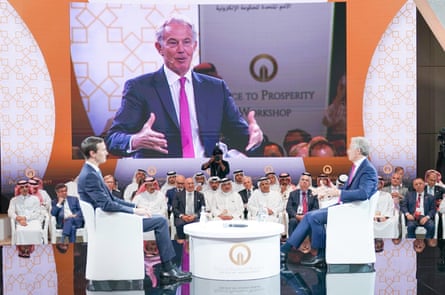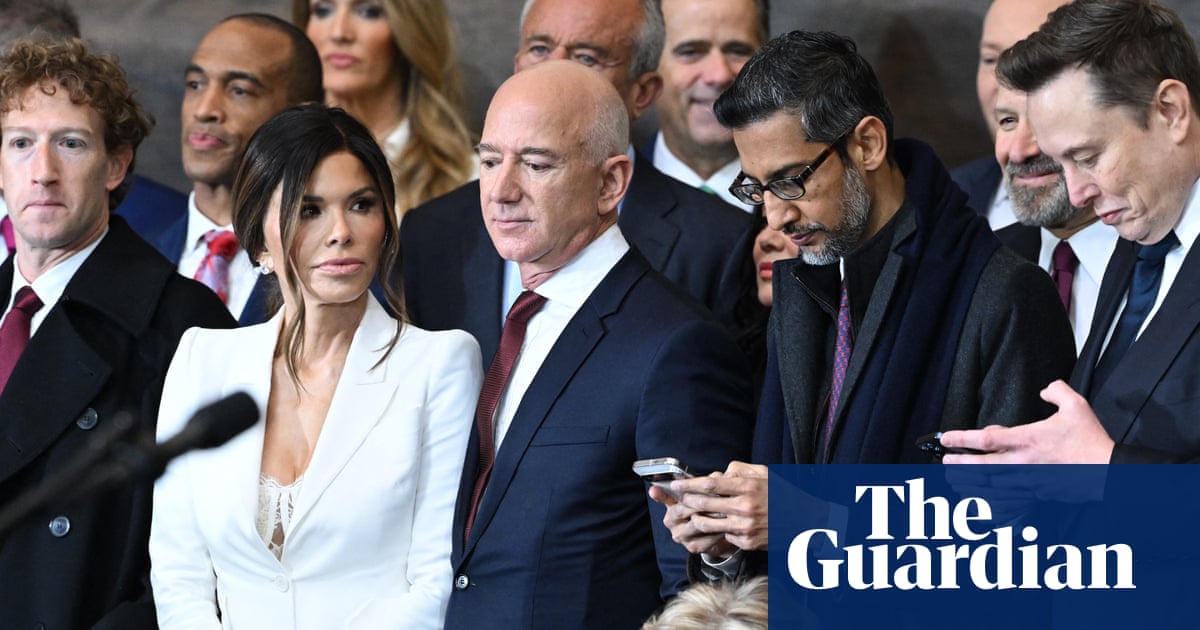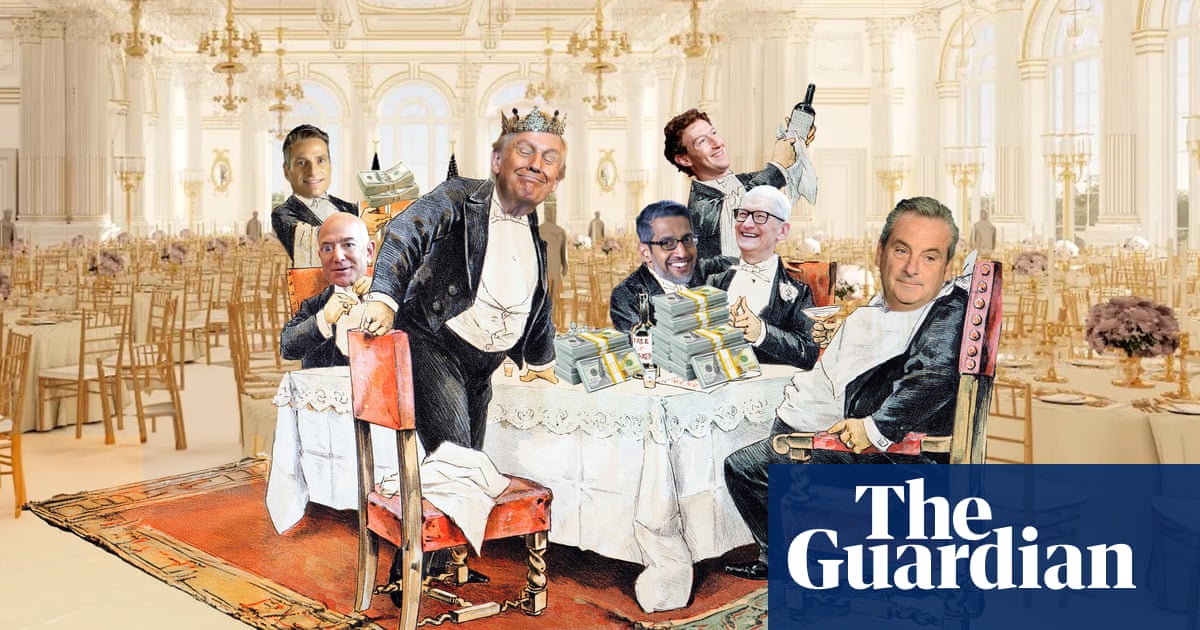“There are two types of politician,” Tony Blair observed in 2012. “Reality creators and reality managers.” While postwar politics was generally a matter of steady management, he claimed, the emerging order called for more creativity, “both in the economy and foreign policy”. Only a particular type of visionary leader was fit for the task.
More than a decade later, Blair has now joined forces with the pre-eminent reality-creator, Donald Trump, to draft a hallucinatory 20-point plan for Gaza. It aims to turn the devastated Strip into what seems to resemble a colonial protectorate: cleansed of armed conflict, buzzing with development projects and a “special economic zone” through which foreign capital can flow, and overseen by an international “board of peace” with Trump himself as chair.
The authors of the programme have not explained how they intend to impose it on a resistant population, or how they will persuade Hamas to disarm and concede defeat. So there is a high likelihood that the Blair-Trump fantasy will remain just that. Whatever its fortunes, though, it is a clear reflection of our historical moment, representing the most recent mutation of an imperial worldview that has already left a trail of destruction across the Middle East.
For Blair, “the economy and foreign policy” have long been entwined. His military adventures in Iraq and Afghanistan tried to spread the virtues of the market to supposedly backward nations. The privatisation of resources created new investment opportunities, while a wide range of profiteers, from weapons dealers to security contractors, made a killing off the wars themselves.
Upon leaving office in 2007, Blair immediately took up a post as Middle East envoy for the so-called Quartet: the United Nations, European Union, United States and Russia. His work in Palestine displayed the same unerring faith in free enterprise. He proposed a series of “industrial parks” to attract foreign investment, advocated eccentric agribusiness and tourism schemes, and promoted other ventures that raised questions about possible conflicts of interest: while being paid £2m per year as a JP Morgan adviser, for example, he was accused of using his Quartet role to advance the interests of JP Morgan clients. (Blair denied the claims, insisting he did not know about the links between the bank he worked for and the companies it served.)
As envoy, Blair often bypassed or rejected political solutions – fighting vigorously against Palestinian attempts to win statehood at the UN – and instead treated economics as the route to progress. His diplomatic activities seemed to be based on the notion that peace would naturally follow prosperity. If securing the latter was the task of the intrepid statesman, then strong ties to the business sector could perhaps be framed as an asset.
Yet Blair’s tenure in the Middle East brought no diminution of the conflict. In 2012, a senior Palestinian official gave a succinct assessment of his record: “Useless, useless, useless.” Still, undeterred by failure and fond of dramatic political comebacks, the former prime minister now appears to be seeking to apply the same logic to Gaza. Since the early months of the war, he has reportedly been crafting his plan for the “day after”.
Staff from his thinktank, the Tony Blair Institute for Global Change (TBI), participated in a project that appeared to endorse ethnic cleansing in the territory and outlined what could be built atop its mass graves: a “Trump riviera”, an “Elon Musk smart manufacturing zone”, “regional datacentres”. Although Blair’s organisation claimed it had no meaningful involvement in the plan, and rejected the idea of displacing Palestinians, there are a number of continuities with his own blueprint, details of which were soon leaked to the press.
Drawn up with the help of Trump’s son-in-law Jared Kushner, the 21-page document suggests reconstructing Gaza through “public-private partnerships”, forged by a “commercially driven authority, led by business professionals and tasked with generating investable projects with real financial returns”. Hamas would be demobilised and a small unelected executive would be installed. This would include Blair himself in a prominent role, plus “leading international figures with executive and financial expertise” and “at least one qualified Palestinian representative (potentially from the business or security sector)”. An international stabilisation force would meanwhile put down “threats to public order”.

Blair met Kushner and Trump in the White House on 27 August and his proposals got a warm welcome from the president. They have since been refined and repackaged as the Trump “peace plan”. As with previous versions of the initiative, the emphasis is on creating a Gaza that is “conducive to attracting investment”, and in which Israel will continue to reign supreme. Blair is primed to take charge of governing the Strip until some unspecified future point when day-to-day administration may be returned to a “reformed” Palestinian Authority.
after newsletter promotion
The practical issues are glaring. Which states would be irresponsible enough to send troops to serve this novel dictatorship? How can it hope to sustain itself with no mandate nor legitimacy? Even more striking, however, is the extent to which the plan signals the overlap between Blair’s ethos and Trump’s.
It is not unreasonable to suggest that Blair might see a business opportunity beneath the rubble of Gaza. To figure out who may benefit, we can look at his network of paymasters. Since 2021, Larry Ellison, founder of the tech company Oracle, has donated or pledged £257m to the TBI. The thinktank has, in turn, transformed into what one commentator has called an “Oracle dealership”: promoting the company’s software around the globe, including in impoverished countries where it has been criticised for potentially “trapping” and “indebting” users. Ellison is also a prominent supporter of Israel who has given millions to the Friends of the Israel Defense Forces and, according to Haaretz, once offered Benjamin Netanyahu a seat on the Oracle board. Were Blair to rule over Gaza – perhaps establishing “regional datacentres” in line with the TBI-linked plan – it is possible that Ellison could wield major influence.
The TBI has also received huge sums from the authoritarian regimes of Saudi Arabia, Bahrain and the United Arab Emirates, while Blair has been given a lucrative advisory contract by the UAE state-owned investment firm Mubadala. All three states have readily endorsed the plan for Gaza. Once the besieged enclave is opened for investment, they may well be first in line. Blair’s work for these petro-monarchies tallies with his involvement in the fossil fuel industry, having taken cash from a BP-led consortium, the oil company PetroSaudi and the South Korean UI Energy Corporation, which has interests in the Middle East. Given that Israel has recently granted new licences to explore for oil and gas off the Mediterranean coast, such connections could prove significant later down the line.
In one sense, then, this “peace plan” could simply be read as an extension of Blair’s belief in market-led development. Yet this chapter in the annals of colonialism also has a uniquely Trumpian twist. Visions of a new world order that underpinned earlier regime-change projects are gone. Here politics is reduced to dealmaking, grand strategy to crude self-interest. The fusion of public power and private profit is complete. Blair may be creating new realities, but few would want to inhabit them.
-
Oliver Eagleton is an associate editor at the New Left Review and author of The Starmer Project: A Journey to the Right

 German (DE)
German (DE)  English (US)
English (US)  Spanish (ES)
Spanish (ES)  French (FR)
French (FR)  Hindi (IN)
Hindi (IN)  Italian (IT)
Italian (IT)  Russian (RU)
Russian (RU)  3 weeks ago
3 weeks ago
























Comments